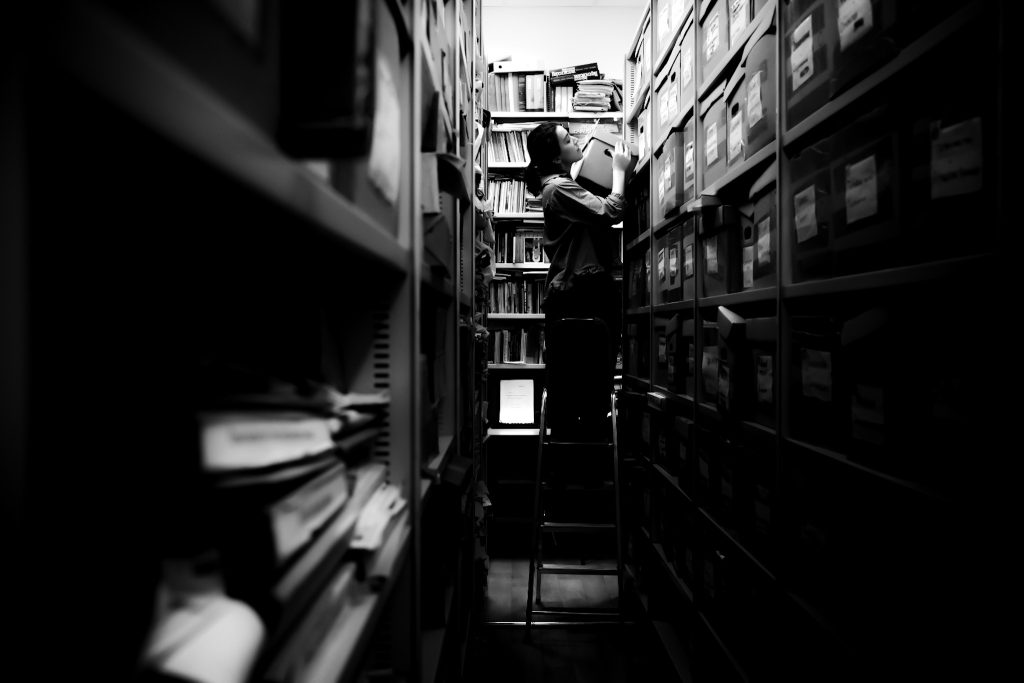Scroll down for English
Välkommen till en presentation och samtal med Alexandra Polivanova, medarbetare på Memorial i Moskva, och Maria Lind, kulturråd vid Sveriges ambassad i Moskva, om den ryska organisationen Memorial som i år tillsammans med två andra organisationer belönas med Nobels fredspris.
I november 2021 aviserade den ryska staten inledningen till en rättslig likvideringsprocess av de två Memorial-organisationerna i Moskva: International Memorial Network och Memorial Human Rights Center. Efter två rättegångar, 28–29 december samt en andra instans 28 februari, fastställdes domen – fyra dagar efter att Rysslands fullskaliga militärinvasion av Ukraina inletts.

Memorials arkiv. Foto: Alice Milchin
Memorial i Ryssland växte fram under perestrojka-åren i syfte att studera och analysera de brott mot mänskliga rättigheter som begicks under Josef Stalins styre. Sedan dess har Memorial arbetat intensivt med lokalavdelningar inom och utanför landet, men under stigande press. Vad har Memorial åstadkommit under de här trettio åren? Varför ansåg sig ryska myndigheter nödgade att krossa Memorial 2021 – 2022? Varför är kritiska reflektioner om den sovjetiska terrorn, brott begångna för hundra, åttio eller femtio år sedan, fortfarande en akut angelägenhet för Ryssland? Hur har Memorials arbete förändrats under det senaste året? Hur ser det ryska civilsamhället ut idag och hur förhåller vi oss till antikrigsagendan?
Evenemanget genomförs som en del av projektet The Prism of the Past: An exchange on critical cultural heritage.
Alexandra Polivanova är styrelsemedlem i det numera likviderade Memorial, och representerar idag organisationen Memorial Ryssland. Hon är född i Moskva. Hon har studerat nordisk och rysk litteratur och historia samt psykologi i Ryssland, Sverige och USA. Hon har även verkat som översättare från svenska, och hon har arbetat som projektledare inom kulturområdet på Sveriges ambassad i Moskva. I Moskva har hon också varit curator för en rad utbildningsprogram för unga i samband med olika festivaler. Därutöver var hon författare och regissör för det dokumentära teaterprojektet Second Act. Grandchildren baserat på intervjuer med barnbarn till Stalintidens förövare. Sedan 2013 ansvarar hon för Memorials efterforsknings- och utbildningsprojekt Moscow. A Topography of Terror.
Maria Lind är curator, konstskribent och utbildare. Sedan 2020 arbetar hon som kulturråd på Sveriges ambassad i Moskva.
English
Memorial and Russia: from 1989 to 2022
Date: Thursday 1 December 2022
Time: 5.30 – 7 pm
Place: Konstnärsnämnden, IASPIS
Address: Maria skolgata 83, Stockholm, Sweden
Language: English
Free admission, no reservation needed
Welcome to a presentation and conversation with Alexandra Polivanova and Maria Lind about the Russian organisation Memorial, that together with two other organisations, is the winner of the Nobel Peace Prize 2022.
In November 2021, the Russian state announced the beginning of the process of legal liquidation of two Memorial organisations in Moscow: the International Memorial network and the Memorial Human Rights Center. The decision of two courts on liquidation was made on December 28 – 29, the second instance confirmed the decision on February 28. Four days after February 24, when Russia’s full-scale military invasion of Ukraine began.
Memorial in Russia arose during the years of Perestroika, studying and examining the human rights violations and other crimes committed under Joseph Stalin’s reign. Since then Memorial has worked intensively, although under increasing pressure, with branches across the country, and beyond. Why did the Russian state need to destroy Memorial in 2021 – 2022? What has Memorial been doing during these 30 years? Why is the critical reflection on the Soviet terror, crimes committed 100, 80, 50 years ago, still an urgent topic for Russia? What is changing in the work of Memorial in 2022? What does Russian civil society look like in 2022 and how do we deal with the anti-war agenda?
The event is a part of the project The Prism of the Past: An exchange on critical cultural heritage.
Alexandra Polivanova is a member of the Board of the liquidated International Memorial, now representing the Russian Memorial. She was born in Moscow, and studied Nordic and Russian literature and history, and social psychology in Russia, Sweden, and the United States. She is a translator from Swedish, and worked as a manager of cultural projects at the Swedish Embassy in Moscow. She was a curator of youth’s educational programmes of different Moscow festivals. In addition, she is the author and director of the documentary theatre project Second Act. Grandchildren based on interviews with grandchildren of perpetrators from the time of Stalin. Since 2013 she is the head of Memorial’s research and educational project Moscow. A Topography of Terror.
Maria Lind is a Swedish curator, art writer, and educator. Since 2020 she is working as the Counsellor of Cultural Affairs at the Embassy of Sweden in Moscow.
